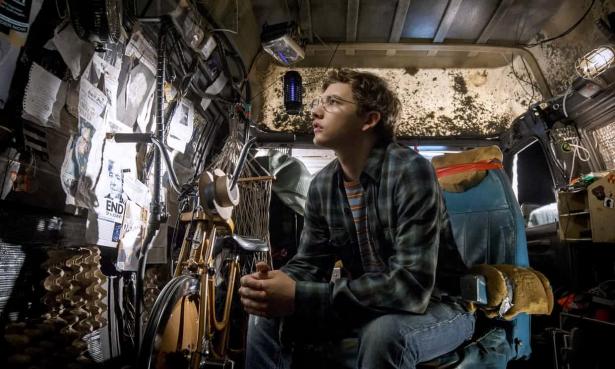Steven Spielberg’s new blockbuster, Ready Player One, is the most significant Hollywood depiction of gamer culture to date. For the first time in mainstream cinema, it presents video games not merely as the cliched subcultural world of geeks and nerds, but as a significant force shaping the future of entertainment, communication, love, and politics.
In this way, it does justice to the importance of video games, which have an increasing role in social and cultural life. On the other hand, it’s fraught with gender problems, reverence for elitism, and a rightwing endorsement of the importance of culture over political and economic conditions. As such, the celebrated director is showing the worst side of gamer culture.
The movie adapts Ernest Cline’s 2012 novel, in which “most of the human race spend all of their free time inside a video game” powerful enough to transform “entertainment, social networking and even global politics”. It’s a thought-provoking dystopian metaphor for the role of social media and online gaming today, but its politics are in serious need of analysis.
For one thing, Spielberg’s movie significantly amplifies the already dangerous girl-problem of Cline’s book. The story’s “Oasis” is an online avatar space combining large-scale multiplayer online gaming with social media. The film offers two ways of understanding the appeal of this dream-like virtual reality: the male protagonist Wade Owen Watts (known as Parzival in Oasis) thinks the space is liberating because “we exist as raw personality in here”, whereas the female character Samantha Evelyn Cook (Art3mis) disagrees, saying: “Everything about our online personas is filtered … which allows us to control how we look and sound to others. The Oasis lets you be who you want to be. That’s why everyone is so addicted to it.” The male gets to feel free, while the female has to respond to the male gaze.
While the original book presents these responses somewhat critically and uses them to comment on the gender politics of video game culture, the movie shows them to be the natural outlook of male and female users, and also normalises the male desire for anime eyes and svelte or augmented bodies. The movie presents technologies of gaming only as a way to realise existing desires, and is not able to think critically about how video games actually transform, distort and create desire in gendered ways.
Tye Sheridan as Wade Owen Watts, aka Parzival. Photograph: Allstar/Warner Bros
Furthermore, the film’s supposedly revolutionary team of libertarians are decidedly rightwing. Ready Player One puts politics and economics to the side to fight the problems of contemporary life on a cultural level: the very method used by the “alt-right”. The premise is that the corporate domination of the Oasis can be defeated only by a group of fanboys who know all the nostalgic references and hidden corners of the online world. The movie is itself filled with lots of “Easter eggs” so that viewers themselves can take pride in their elite knowledge of pop culture.
Far-right 4-Chan boards and Reddit threads have long pronounced this logic to support their approach – even misusing the leftwing philosopher Antonio Gramsci, who argued that political and economic change could be brought about via “culture wars”. Spielberg’s film, then, while presenting itself as a progressive rebellion tale, replicates the logic of the political right today. The conclusion of the story bears this out, when the elite team of knowledgeable heroes take control of the Oasis from the corporate powerhouse, but then run the virtual world in much the same way as before. It’s akin to a small group of message-board users and meme experts taking power from the established centre and then maintaining the status quo, leaving millions of underprivileged people in poverty and an unjust social hierarchy in place while they benefit. The culture wars are won, but the economic structure remains intact.
The story turns on the actions of the “missing millions” – a lost generation mobilising against corporate and state power. This video game generation, however, is represented as a male-dominated and elitist group who believe shared cultural references and in-jokes are more important than cross-cultural solidarity and economic change. The movie encourages us to ally with those who share cultural reference points with ourselves – a dominant rightwing idea – instead of empathising and allying with those who might be different to us.
The video game world has great potential to represent progressive agendas, shown by the emergence of games such as Post-Capitalism, Nova Alea and Papers, Please, each of which point to the structural economic conditions underlying cultural experience. A new gaming novel Bash Bash Revolution, released this week, is in some ways the antithesis to Ready Player One, even imagining how artificial intelligence could work against capitalist production. For all the attention, Spielberg’s movie neglects this potential, to show gaming simply in its worst light.
• Alfie Bown is the author of The Playstation Dreamworld, a philosophy of games and politics
Since you’re here …
… we have a small favour to ask. More people are reading the Guardian than ever but advertising revenues across the media are falling fast. And unlike many news organisations, we haven’t put up a paywall – we want to keep our journalism as open as we can. So you can see why we need to ask for your help. The Guardian’s independent, investigative journalism takes a lot of time, money and hard work to produce. But we do it because we believe our perspective matters – because it might well be your perspective, too.
I appreciate there not being a paywall: it is more democratic for the media to be available for all and not a commodity to be purchased by a few. I’m happy to make a contribution so others with less means still have access to information.Thomasine, Sweden
If everyone who reads our reporting, who likes it, helps fund it, our future would be much more secure. For as little as $1, you can support the Guardian – and it only takes a minute. Thank you.




Spread the word